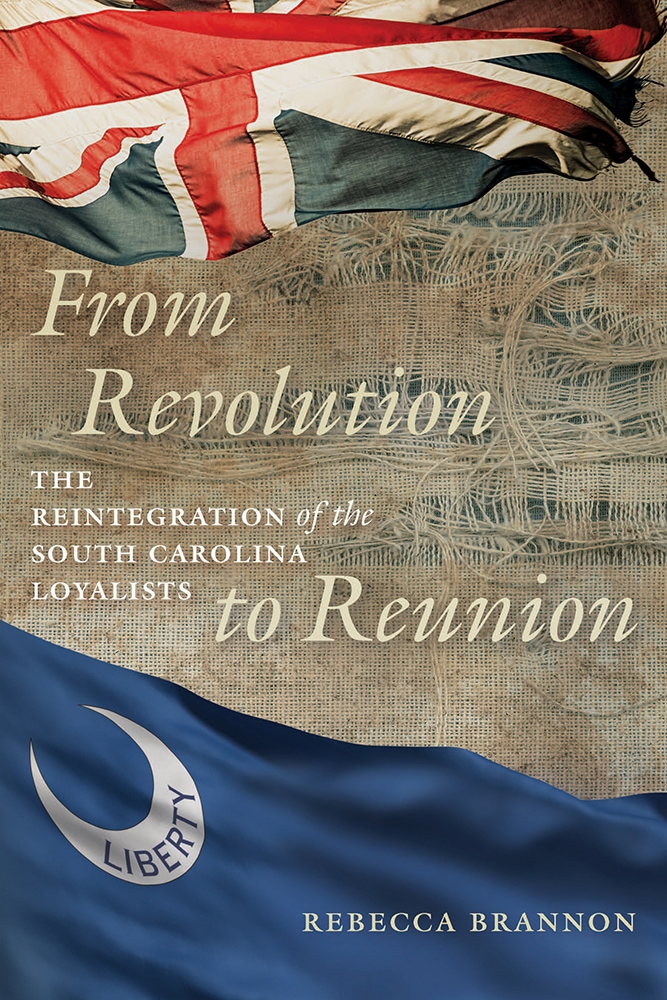Black History Month Sale: 40% off all books, plus FREE SHIPPING on all U.S. orders over $50 | Use code JBHM26

Size: 6 x 9
Pages: 236
Illustrations: 12 b&w halftones
Rebecca Brannon
The inclusion of this book in the Open Carolina collection is made possible by the generous funding of
"Drawing on insights from psychology as well as from her reading of the historical record, historian Brannon illuminates the reconciliation of South Carolina loyalists with the patriot victors of the American Revolution."—Choice
"A richly informative account of South Carolina white Loyalists who embraced the British empire during the Revolutionary period but integrated themselves into the new state after the war... Anyone interested in how Loyalists obtained their citizenship in the early republic will profit from carefully studying this book."—The Journal of Southern History
"From Revolution to Reunion is expansive in its research, persuasive in its arguments, and genuinely sympathetic in its treatment of sources generated by people living through the most traumatic of times."—H-Net Reviews: H-Early-America
"Starting in 1775, white Patriots fought a series of savage guerrilla wars, not only against redcoats, Indians, and their own slaves, but against Loyalist whites. Yet with peace in 1783, white Loyalists and Patriots rapidly reconciled. Rebecca Brannon's effort to unravel that paradox is wonderfully provocative."—Woody Holton, Peter and Bonnie McCausland Professor of History, University of South Carolina
"This highly original study reconstructs an American Revolution that most historians ignore. At the end of the conflict and with memories of Loyalist violence still fresh, South Carolina's patriot leaders supported reconciliation with former enemies over revenge. Brannon's impressive work helps explain the remarkable transition from wartime chaos to political stability."—T.H. Breen, author of American Insurgents, American Patriots: The Revolution of the People
"Rebecca Brannon analyzes in impressive detail and with unique insight the importance of extra-legal mechanisms by which local communities moved rapidly towards forgiveness and reconciliation. South Carolina provides the exemplary case whereby early national citizenship was forged through the capacity to forgive and forget."—Philip Gould, Brown University
"Brannon's compelling account of the reintegration of South Carolina's loyalists in post-war America deftly explains the inexplicable. It details the process by which inhabitants of a state torn apart by civil war bowed to a combination of economic imperatives and the very human desire to reestablish emotional ties, leading them ultimately to forgive and forget."—Sheila Skemp, Clare Leslie Marquette Professor of American History, University of Mississippi
"Rebecca Brannon addresses a subject that preoccupied an earlier generation of historians, namely South Carolina's policy of leniency towards former loyalists following years of British occupation and bloody civil war. Focusing primarily on loyalists who remained in the state, she offers a fresh, comparative approach to the history of South Carolina in the Revolutionary Era."—Rachel N. Klein, University of California, San Diego
"Rebecca Brannon's work probes the fate of American loyalists who quietly and stubbornly remained in the new republic at the end of the war. Her analytical reach and imaginative research create an extraordinary book. She uncovers how and why South Carolina's patriots generously forgave their neighbor-loyalists after enduring a bloody and violent civil war. Her sensitive examination of loyalist decision making as well as loyalist reintegration tell us something unfamiliar—and deeply meaningful—about the revolutionaries."—Ruma Chopra, associate professor of history, San José State University
Winner of the 2016 George C. Rogers Book Award, awarded by the South Carolina Historical Society
Copyright 2026
Website By Morweb.org